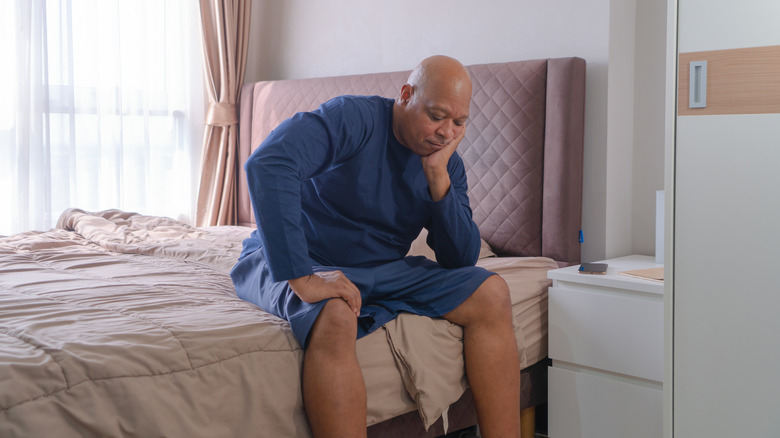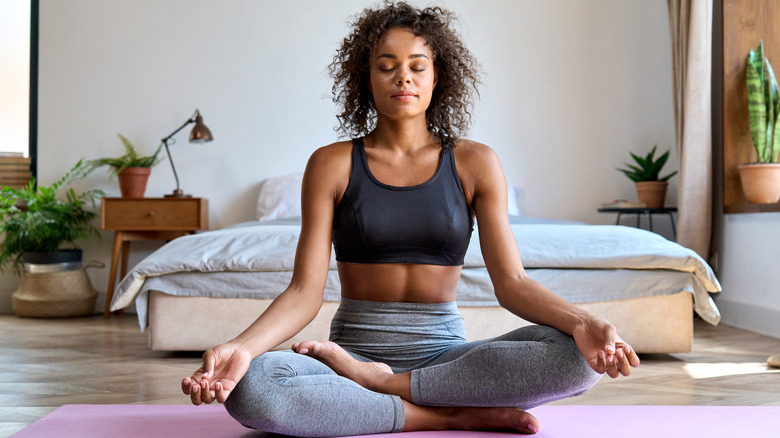Does Starting A Keto Diet Help With Anxiety?
There are many benefits to the keto diet, and it's possible that anxiety reduction can be added to the list. The keto diet, which is rich in healthy fats and proteins while being low in carbohydrates, has been found to decrease cognitive decline, fight acne, aid in weight loss, and reduce cholesterol (via MedicalNewsToday). Additional benefits include lessening symptoms of polycystic ovary syndrome (PCOS), seizure episodes in people who have epilepsy, and the risk of both cardiovascular disease and several cancers. While the keto diet isn't recommended for everyone, like people with diabetes and women who are currently pregnant or breastfeeding, it can serve as a helpful diet plan for others.
The ketogenic diet, or the keto diet as it's popularly known, dates back to the 1920s, when Dr. Russell Wilder from Mayo Clinic began experimenting with a diet focused on healthy fats that ultimately depleted sugar from the body, reports Men's Health. The concept of the diet is that your body will learn how to pull its energy from healthy fat sources instead of from carbohydrates. At times, the keto diet has been controversial as it can have side effects, like kidney stones, vitamin deficiencies, and a buildup of fat in the liver (per MedicalNewsToday). However, if conducted in a balanced and intentional way, the keto diet's advantages can be extremely beneficial.
Anxiety may increase during the keto flu
When first beginning the keto diet, your body will enter a state called ketosis after a few days, per WebMD. Otherwise referred to as the keto flu, going into ketosis can cause several undesirable and uncomfortable side effects that can be difficult to tolerate, especially for people who have anxiety. These side effects include nausea, constipation, headache, sleep disturbances, abdominal and muscle cramps, irritability, fatigue, and brain fog. Many people also experience bad breath during the keto flu period. The namesake of this experience comes from the way the symptoms mimic influenza. The keto flu generally starts approximately three days after you begin the keto diet and lasts for about a week.
Due to the sudden drop in carbohydrates being consumed, it's possible that you may experience symptoms of depression during the keto flu, which can exacerbate anxiety-related symptoms in people who experience anxiety disorders (per WebMD). Since the keto flu can make it difficult to fall and stay asleep, thus decreasing the total amount of sleep you get and potentially leading to fatigue, anxiety can further worsen during this time. If you have an anxiety disorder and want to give the keto diet a try, it's best to consult with your doctor or mental health professional and closely monitor your experience for an increase in symptoms.
How the keto diet affects anxiety
If you can make it through the keto flu period, then the keto diet can have some great effects when it comes to anxiety. Once your body transitions into ketosis, the neurotransmitter GABA may start to increase (per DiabetesUK). Since some anxiety disorders have been found to result from dysfunction within GABA activity, increasing and streamlining GABA production in the brain can lead to a positive impact when it comes to anxiety (via WebMD). Increased and balanced production of GABA can result in not only decreased anxiety, but also lessen obesity risk and manage hypertension.
The dietary change to fewer carbohydrates has been linked to improvements in anxiety, as well as schizophrenia, bipolar disorder, and attention-deficit hyper disorder (ADHD), primarily because of the decrease in inflammation within the body that the diet creates, reports Yahoo. For people with anxiety, breaking dietary habits that may exacerbate anxiety-related symptoms, like added sugars and processed foods, can lead to improvements. Through managing eating habits and rethinking your relationship with food by switching to the keto diet, stress can be reduced and in turn, anxiety can be decreased. For people who have anxiety and want to try the keto diet, it's recommended that healthy habits like hydration, mindfulness, breathing, exercise, and sleep hygiene also be practiced alongside the switch to the keto diet.



